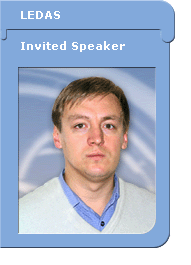
iPLM strategy: adding intelligence to PLM software
LEDAS has considerable experience of developing highly efficient intelligent engines for engineering and scheduling (such as LEDAS Mathematical Solver, Geometric Solver, Scheduler, Workforce Optimizer and other forthcoming intelligent engines developed at LEDAS) as well as their subsequent integration with commercial PLM solutions (CATIA V5). Our experts state that the market of PLM solutions, clearly defined and rapidly growing, creates additional design requirements for intelligent components of this type, as well as ensures long-term demand for this research.
Therefore the company announces a new strategy in which all of its products will be focusing on the PLM solution market. The targets will be defined in more detail shortly, but even now LEDAS sees several possible application areas in the PLM market:
- advanced, efficient tools for solving engineering constraints in the conceptual design phase,
- tools for solving mixed geometric and engineering constraints in the design of parts and assemblies,
- tools for accelerating distributed design processes via exchange of constraints,
- constraint-based calendar and resource planning tools,
- rostering, and finally
- constraint-based database management tools for documentation systems.
LEDAS plans to develop a general outline of a constraint-based engine for the next generation of PLM systems. This engine will include algorithms for the above-mentioned problems. Used as the kernel of a PLM system, it will add intelligence to all PLM processes, allowing the customers to speed up significantly the realization of the various phases in the product's life cycle.
Dmitry USHAKOV, born in 1972, is presently the Chief Technology Officer at Ledas Ltd. He coordinates all IT projects of the company and directly supervises several projects related to the development of constraint solvers for geometric and engineering problems.
Dmitry graduated from the Novosibirsk State University in 1993 with specialization in mathematics and applied mathematics. In 1995, he received the degree of Master of Mathematics, and in 1998, successfully defended a candidate's (doctoral degree) thesis titled "An Object-Oriented Environment for Subdefinite Calculations".
In 1993, Dmitry began working for the Russian Research Institute for Artificial Intelligence. His interests were in the area of theoretical justification of the apparatus of subdefinite models (which are a special type of constraint programming) and development of the NeMo+ software environment for solving a broad range of constraint satisfaction problems in various fields. Since then, he and his colleagues have written about 30 research papers, most of them presented in international conferences and published in various research journals and collections. The Sixth National AI Conference in 1998 named NeMo+ "the best Russian intelligent system of the year". In the same year, the system was purchased by Dassault Systemes (France), and Dmitry visited the company several times for adaptation of the system to the local software environment and for training of the French specialists.
Since 1999, Dmitry has been on the staff of LEDAS. Until 2001, he was responsible for the cooperation with Dassault Systemes. During the two-year stay in France, he was working on a number of knowledgeware components based on the NemoNext math solver for CATIA V5.